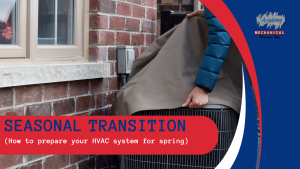As we approach some of the hottest days of the year, it’s important to understand how extreme heat can affect your HVAC system. At Academy Mechanical Services Inc. we know that keeping your home cool and comfortable during these scorching months is a top priority. However, high temperatures can put a lot of stress on your air conditioning system. Let’s look at how extreme heat impacts your HVAC system and what you can do to ensure it runs efficiently all summer long.

Increased Strain on the System:
During periods of extreme heat, your air conditioner has to work harder to maintain a comfortable indoor temperature. This increased workload can lead to several issues:
- Higher Energy Consumption: as your system works overtime, it uses more energy, resulting in higher utility bills.
- Wear and Tear: The additional strain can accelerate the wear and tear on components, leading to more frequent repairs and a shorter lifespan for your system.
- Overheating: In some cases, the system may overheat, causing it to shut down temporarily or suffer from permanent damage.
Reduced Efficiency:
Extreme heat can reduce the efficiency of your air conditioner in several ways:
- Heat Transfer:Your air conditioner relies on the ability to transfer heat from inside your home to the outside environment. When outdoor temperatures are extremely high, this process becomes less efficient, making it harder for your system to cool your home.
- Refrigerant Levels: High temperatures can cause refrigerant to evaporate more quickly. If the refrigerant levels drop too low, your air conditioner won’t be able to cool your home effectively.
- Dirty Components: Dust and debris can accumulate on your air conditioner’s coils and filters, further reducing efficiency. This is particularly problematic during heatwaves when the system is running constantly.
Increased Risk of Breakdowns:
The intense workload during extreme heat periods can lead to unexpected breakdowns. Common issues include:
- Compressor Failure: The compressor is the heart of your air conditioning system. If it overheats or experiences too much stress, it can fail, leading to a costly repair or replacement.
- Electrical Problems: High demand can cause electrical components to overheat and malfunction, leading to system failures.
- Frozen Coils: Strangely, if your system is struggling to cool your home in extreme heat, it can cause the evaporator coils to freeze, which stops the cooling process altogether.
So, what can you do to keep your air conditioning system running smoothly during the hottest months? Here are a few tips:
- Schedule Regular Maintenance: Regular maintenance is crucial for keeping your HVAC system in good working order, especially during extreme heat. Our technicians at Academy Mechanical Services Inc. can perform a thorough inspection, clean vital components, check refrigerant levels, and ensure everything is running efficiently. Regular check-ups can help prevent small issues from becoming major problems.

- Change your Air Filters: Dirty air filters can restrict airflow and make your system work harder. During the summer months, it’s a good idea to check and replace your air filters more frequently to ensure optimal performance.
- Use a Programmable Thermostat: A programmable thermostat can help you manage your home’s temperature more effectively. Set it to a higher temperature when you’re not home and lower it when you return. This reduces the strain on your system and saves energy.
- Keep the Area Around Your Unit Clear: Make sure there is no debris, such as leaves or dirt, around your outdoor unit. Good airflow is essential for your system to work efficiently.
At Academy Mechanical Services Inc., we are here to help you keep your home cool and comfortable no matter how high the temperatures rise. Contact us today to schedule your maintenance appointment and give your HVAC system the care it needs to beat the extreme heat.







